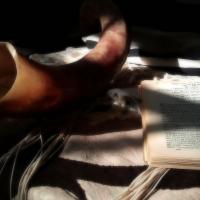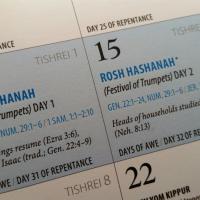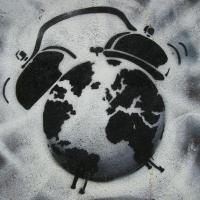Beth Immanuel is a friendly and welcoming community. Click here to learn what to expect when you visit.

What is Rosh Hashanah?
An ancient Israelite farmer takes an inventory of the fruits of his labor, now that the summer harvest is complete. Having separated the tithes, first fruits, and other sacred portions, he divides up the rest. He estimates what portion of his crop he can invest as seed for the new planting, what he will need as food for his household, and what he can sell for a profit.
At the same time, he takes an inventory of his spiritual life. Have I labored in God’s Word? Have I produced the fruit of good deeds as an outgrowth of my faith? Have I set apart those things that belong exclusively to God? When God makes an accounting of my life, where will I fall short and rely on his mercy? How can I do better next year?
When you look at some calendars you might notice the day labeled “Rosh Hashanah” either in September or early October. This is an important Jewish holiday which comes right from the Bible. It has important and deep spiritual meaning that is relevant to both Jews and Christians.
The Hebrew words Rosh Hashanah literally mean “head of the year,” as it is when the yearly agricultural cycle begins in the land of Israel. That means that the Sabbatical and Jubilee years described in Leviticus 25 are counted at this time, being tied to the agricultural season.
Even so, the Bible usually refers to months using numbers instead of names. According to Exodus 12, these numbers begin with the spring month when Passover occurs. Thus, even though Rosh Hashanah marks the new agricultural year, it happens in the seventh month.
The Scriptural Source
The Bible refers to the holiday in this way:
Speak to the people of Israel, saying, In the seventh month, on the first day of the month, you shall observe a day of solemn rest, a memorial proclaimed with blast of trumpets, a holy convocation. You shall not do any ordinary work, and you shall present a food offering to the LORD. (Leviticus 23:24-25 ESV)
Most of the appointed times in Leviticus 23 are described in a similar way. What really makes this day unique is the phrase, “a memorial proclaimed with blast of trumpets.” More literally from Hebrew, it is “a memorial of sounding.” Trumpets are not actually mentioned, but the Hebrew word implies a loud, alarm-like noise. Since ancient times Jewish people have observed this holiday with the sounding of a trumpet called a shofar, fashioned from the horn of a ram.
To summarize, we know a few things from the biblical text:
- It occurs at the beginning of the agricultural cycle.
- It is a memorial.
- It is observed with the alarm-like sound of a trumpet.
A Day of Remembrance
Rosh Hashanah is a memorial, but of what? What does one remember or commemorate on this day?
The agricultural cycle was the basis of the ancient economy, so Rosh Hashanah marks the turn of the fiscal year. We have gathered in all of our harvest. We have counted and totaled it. We have divided it into its proper categories and uses. In the process, we remember the course of events throughout the year and how our plans, skills, efforts, and natural forces contributed to the end result—all under the hand of God.
As the alarm sounds, we are alerted that God is doing the same type of reckoning and remembering. He gathers in all of his people, so to speak, assessing and evaluating their spiritual growth and fruitfulness over the course of the year. He separates us all into categories, determining how he will use us and what he will entrust to us in the coming year.
In a sense, it is as though our every deed throughout the year is recorded in a book. On Rosh Hashanah, this book is reviewed and the events remembered.
This yearly assessment is not to determine final destinies or salvation in the afterlife. It is more like a yearly review with your employer: How did you do this year? What could you do better? How could the company best use you in the year to come?
However, the holiday is indeed reminiscent of what eventually will take place at the end of our lives and at the end of the age. It is much like a rehearsal for those future events.
Rosh Hashanah and the New Testament
Jesus often taught about things that relate strongly to Rosh Hashanah themes. In his parables, he sometimes depicted God as an employer who demands an accounting (Matthew 25:14–30; Luke 16; 19:11–27). He spoke often about the harvest in terms of human souls (Matthew 13, Luke 8), and he referred to dividing between who is spiritually fruitful and who is not (Matthew 7:15–20; 12:33–45; 25:31–46; Luke 6:43–45).
The “book of life” in which our names and deeds are recorded is one of the main symbols of Rosh Hashanah. The New Testament also talks about this (Luke 10:20; Philippians 4:3; many places in Revelation). It also talks about the record of our debt due to our sins, which was canceled and forgiven through Messiah (Colossians 2:14). It speaks of our sins being “blotted out”—that is, erased—through repentance, which implies that they were once written down (Acts 3:19).
The New Testament also often speaks of the shofar (the trumpet). In Matthew 24:31, this accompanies the gathering of the elect. In 1 Corinthians 15:52 and 1 Thessalonians 4:16 it announces the resurrection from the dead. In Revelation 8–9 it accompanies judgments on the earth. All of these are Rosh Hashanah themes.
Observing Rosh Hashanah Today
With all its serious themes, Rosh Hashanah is both introspective and hopeful, but it is not a sad or somber day. On the eve of Rosh Hashanah, families gather for a meal of sweet, delicious food. As the book of Nehemiah relates:
So Ezra the priest brought the Law before the assembly, both men and women and all who could understand what they heard, on the first day of the seventh month. (Nehemiah 8:2 ESV)
Then he said to them, "Go your way. Eat the fat and drink sweet wine and send portions to anyone who has nothing ready, for this day is holy to our Lord. And do not be grieved, for the joy of the LORD is your strength." (Nehemiah 8:10 ESV)
In the morning, the shofar is sounded many times along with the prayers. The prayers pay special attention to the kingship of God, remembrance of our deeds, and repentance.
In the afternoon, it is customary to confess one’s sins near a body of water.
Rosh Hashanah is a powerful and inspiring holiday. It reminds us to be diligent in our service of God at the same time that it assures us of God’s forgiveness and mercy. It instills in us an awareness of the ingathering yet to come, with the return of the Messiah and the resurrection of the dead.




